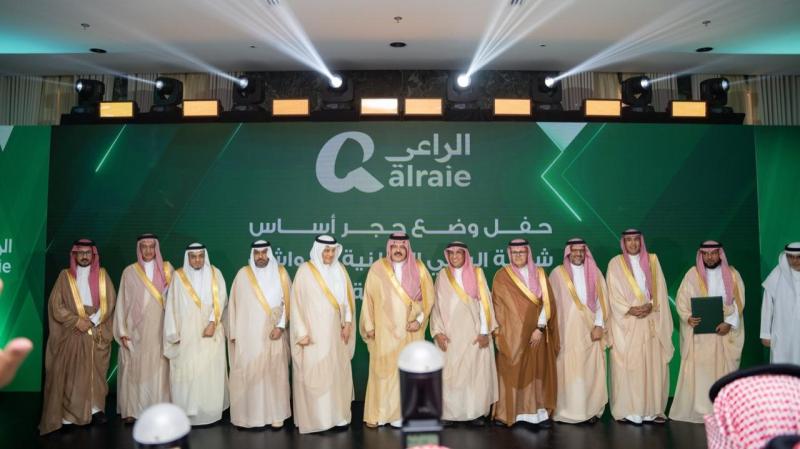
His Royal Highness Prince Abdulaziz bin Saad bin Abdulaziz, Governor of Hail Region, laid the foundation stone for the Alraie National Livestock Company project, in the presence of His Excellency the Minister of Environment, Water and Agriculture, Eng. Abdulrahman bin Abdulmohsen Al-Fadley, along with a number of officials from the public and private sectors. The company is a joint venture between the National Agricultural Development Company (Nadec) and Al Muhaidib Group, established to enhance self-sufficiency in red meat production, reduce dependency on imports, and develop a high-efficiency local food supply chain. The project also aims to protect the environment and empower small-scale livestock farmers in the region, in line with the goals of Saudi Vision 2030.
HRH the Governor emphasized the strategic importance of the project in transforming the livestock sector and boosting local red meat production by applying the highest global standards and best practices. He praised the Ministry of Environment, Water and Agriculture for its continued efforts in supporting and developing the livestock sector and advancing food security, particularly through empowering and equipping livestock farmers—contributing to sustainable rural development.
Prince Abdulaziz added that the Hail Region, with its ideal geographical features, integrated infrastructure, and advanced logistics services, is well-positioned to become a national and regional hub for food security and livestock farming. The project is designed to reach an operational capacity of one million heads of sheep annually.
During the ceremony, HRH witnessed the signing of several Memorandums of Understanding (MoUs) between the project and strategic partners, including the University of Hail, the Sulaiman Al Rajhi Development Finance Foundation, and the Intaj Society for Development and Empowerment.
For his part, Minister Al-Fadley stated that the project is the outcome of a strategic partnership between Nadec and Al Muhaidib Group, with financing from the Agricultural Development Fund exceeding SAR 1 billion, as part of total projected investments of over SAR 2 billion. He highlighted that the project is the first of its kind globally in terms of its integration—encompassing breeding, production, processing, distribution, and preservation of local livestock breeds within a smart, sustainable, and fully integrated ecosystem.
He added that the Alraie project represents a national model for enhancing the efficiency and sustainability of the agricultural sector, increasing domestic red meat production, and reducing reliance on imports. The company aims to produce one million sheep annually through a fully integrated system covering breeding, care, and production, while also utilizing by-products to increase value and reduce waste. This marks a strategic leap in livestock sector development and a significant contribution toward achieving national food security and promoting sustainability.
Eng. Al-Fadley further explained that the initiative aligns with the Ministry’s objectives of strengthening public-private partnerships and enabling high-value investments in intensive livestock farming. It also supports contract farming models, empowering small-scale farmers who will contribute up to 30% of the total production—thereby fostering job creation and rural development. He stressed that such national partnerships are key to building a sustainable agricultural and food future based on innovation, integration, and environmentally responsible practices.
Chairman of Nadec, Mr. Abdulaziz bin Saleh Al-Rabdi, remarked that the Alraie project is more than just a production initiative—it is a comprehensive system for producing safe, high-quality local meat built on innovation and sustainability. He emphasized that the project reflects the collaborative spirit of the public and private sectors, offering smart solutions to preserve rare livestock breeds, minimize waste, and enhance production efficiency.
Sulaiman Al Muhaidib, Chairman of Al Muhaidib Group, noted that the Alraie project aspires to become the nation’s leading reference in the red meat sector and a regional pioneer in production and sustainability. The project aims to increase local market share, lead the transformation of supply chains, and set a new benchmark for livestock management in the Kingdom.